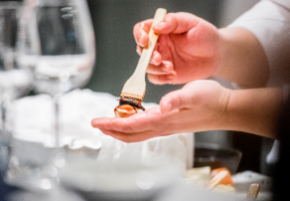- About
- Programs
- Campus Life
- Career Services
- Admissions
- News & Events
- Alumni
How to Start a Baking Business from Home: Steps & Tips
Start your baking business today with this step-by-step guide—learn legal tips, setup, pricing, and how to grow. Turn passion into profit!
Key Takeaways
- A home baking business allows you to make and sell baked goods directly from your own kitchen, often centered around a specific product or style.
- Getting started involves choosing your specialty, writing a business plan, handling legal requirements, setting up your workspace, and launching your first sales.
- Long-term success comes from consistency, listening to customer feedback, and always looking for ways to improve your skills and offerings.
The cakes and pastries you see in store windows or high-end bakeries are polished and picture-perfect—an image many pastry chefs aim for. But there's something just as special, if not more, about a dessert made in someone's own kitchen.
The personal touch, the care, the small imperfections... they’re part of what makes home baking feel thoughtful and genuine. That warmth is also what can turn baking from a hobby into a smart business move—especially when you’re just starting out.
Of course, starting a business is not as simple as having a good recipe and a kitchen. So how to start a baking business from home? It all comes down to a mix of legal steps, logistics, branding, and, most importantly, the right knowledge and skills.
Steps to Starting a Baking Business
Knowing how to bake is a great starting point, but turning that skill into a successful business requires careful organization and planning. The following steps can help you stay on track and build something that lasts.
Choose your baking niche
Your baking niche is essentially the focus of your business and what will help set you apart. It's your specialty that determines the type of product you're known for and the customers you attract.
Rather than trying to cater to everyone, selecting a niche allows you to master a specific area of baking and build a recognizable brand. Some popular and profitable baking niches include:
- Specialty cakes, such as luxury wedding cakes, elaborate birthday cakes, or sculpted celebration cakes
- Dietary-friendly baking, including vegan, gluten-free, dairy-free, keto, and allergen-free baked goods
- Customized decorated cookies or cupcakes for parties, gifts, and events
Create a business plan
Once you've chosen your niche, the next step is to actually start planning how you'll turn that idea into an actual business by preparing a business plan.
Your business plan should include:
- Short-and long-term business goals: What you want to achieve now and in the future
- Target market: Who you’re baking for, and what they’re looking for
- Products and services: What you’ll offer and how they align with your niche
- Startup costs and budget: Equipment, ingredients, packaging, licenses, insurance, and marketing expenses
All of these elements tie directly into one of the most critical decisions you'll make: how to price your goods. It's a step that requires a bit of calculation and a lot of careful consideration.
Set your prices too high, and potential customers might walk away. Set them too low, and you risk losing money or struggling to cover your costs.
This is precisely why market analysis is so important. You need to understand what your competitors charge and what your customers are willing to pay to decide on a price that reflects your value and keeps your business sustainable.
Think of your business plan as a sort of roadmap that can change and adjust as your business grows. The idea is for it to help you see the big picture and stay on track with your goals.
Handle legal requirements
Before packaging your first batch of brownies or delivering a custom cake, ensure your business complies with legal requirements. This action not only protects you but also builds trust with your customers.
Legal requirements regarding home-based food businesses can vary depending on location. For example, in the USA, many states allow home-based bakers to operate under "Cottage food laws."
Other regions and countries permit the sale of home-baked goods but impose specific guidelines about what you can sell, how to label your products, and where you can sell them. Therefore, you must research thoroughly all legal requirements and food safety controls for your area of business.
Set up your baking space
Your workspace always plays a major role in your business's success, whether you bake from your home kitchen or use a commercial facility.
Some essentials for a well-functioning baking workspace include:
- Ample counter space and shelves for organizing tools and ingredients
- Reliable appliances, including a high-capacity oven, mixer, and refrigerator
- Storage solutions for dry ingredients, finished products, and packaging materials
- Good lighting and airflow, especially if you're baking for long hours
- Cleaning and sanitization supplies to keep your space up to code
Branding and packaging
Your branding and packaging play a big role in how your baked goods are perceived. A beautifully packaged cupcake or cookie isn’t just easier to transport—it also elevates the entire customer experience.
Think about how your product will look when handed over, delivered, or posted on social media. Packaging should be functional, especially for “to go” orders and deliveries, but also visually appealing. This could be as simple as a sturdy box, tissue paper, and a sticker featuring your logo or a handwritten thank-you note.
When done well, your packaging becomes part of your brand identity. It helps create a memorable unboxing moment that encourages repeat business, word of mouth, and even free advertising when customers share photos online.
Keep it simple, but intentional. The little details—like color-coordinated ribbons or branded labels—can be the “icing on the cake” that sets your business apart.
Develop your menu
A common mistake that new bakers make is offering too many products too soon, which can lead to burnout and inconsistency. Instead, it's advisable to start with a focused menu that reflects your niche and allows you to perfect a few core items.
It's much easier to build a reputation around a small selection of outstanding treats than to stretch yourself too thin.
When deciding what to include on your menu, always make sure to
- Choose menu items that match your baking niche or specialty.
- Conduct a thorough market analysis before pricing products—consider both cost and customer perception.
- Visit local bakeries, check social media trends, and talk to potential customers so that you can see what's popular and where your product could fill a gap.
- Rely on your strong points and tested recipes that you know work well and you can replicate consistently.
Market your business
You might bake the most incredible cinnamon rolls in the world, but if no one knows about them, you won't be able to make a profit off them. Marketing establishes the essential connection between your passion and real customers, and it is also the way your small business can evolve into a recognized brand.
Social media is a good place to start when marketing your company, especially if you sell aesthetically pleasing products like baked goods.
According to data from Meta, 83% of people discover new products or services on Instagram, 81% use it to research those products, and 80% say it helps them decide whether to make a purchase. Therefore, by posting high-quality photos of your treats, sharing behind-the-scenes content, featuring customer reviews, and using local hashtags, you can create an engaging presence that helps your baking business stand out and grow.
You can also create a simple website that includes:
- Clear product descriptions and prices
- Ordering and contact information
- A gallery of your baked goods
- FAQs, pickup/delivery info, and payment methods
You should also aim to grow your reach through local connections. You can do so by offering samples at farmers' markets, school events, or community fairs to get people familiar with your baking.
Make sure to also ask happy customers for photos and short reviews. When others see real people enjoying your products, it builds trust. Your marketing tactics don't need to be fancy—just honest and consistent.
Start selling and track your progress
Once your business plan is ready, the menu is thought out, the kitchen is prepared, and people know about your craft, you can start selling. You don't need a bakery storefront or a big launch—starting small is completely okay and often smarter.
You should begin with sales channels that are easy to manage, like direct orders through Instagram, Facebook, or messaging apps like WhatsApp or a basic website, even if it's just a single-page site with a form or email link.
Once the sales start coming in, don't forget to track your progress:
- How many orders are you getting each week or month?
- Which products are your best sellers?
- Are you making a good profit on each item?
- What kind of feedback are you getting?
- How many customers are returning for more?
You can improve your decision-making by simply keeping track of your numbers in a notebook or spreadsheet. You'll see what's working and what isn't—and all that data and insight will be what helps your business grow stronger over time.
Tips for Long-Term Success
Running a baking business will be much easier if you incorporate the following tips as you move forward:
- Maintain consistency—stick to the same high standards in your product quality, customer service, and delivery — every time.
- Listen to feedback—whether it's praise or a polite critique, use it to improve your business.
- Reward loyalty—a small freebie, thank-you note, or occasional discount for repeat customers can make someone feel appreciated and more likely to come back.
- Elevate your craft even further by pursuing a culinary degree at Culinary Arts Academy Switzerland (CAAS)—a great next step for serious home bakers and chefs.
- Prepare for busy seasons—holidays and special events can bring a spike in demand.
- Don't take on more than you can handle—build a schedule and leave room for breaks and rest in order to avoid burnout.
- Keep an eye on orders, costs, and profits—the more you understand your business, the better decisions you'll make.
- Use your niche to guide your style—make sure that everything from your logo to your packaging reflects your branding.
- Attend events, meet other vendors, and introduce yourself to small café owners or event planners.
Every great baking business grows one batch at a time—keep improving, stay connected to your customers, and never stop enjoying the process.
From Home Bakery to Commercial Success
Not every talented baker wears a tall white hat and works behind the polished glass of a boulangerie or patisserie. Some find success and build their reputations right from the warmth of their own kitchens. These are the entrepreneurs who manage every detail, from the rise of their dough to the growth of their client list. They're their own boss, and their kitchen is both their creative studio and their office.
However, turning a passion for baking into an actual sustainable and profitable business requires culinary expertise as well as business acumen. At Culinary Arts Academy Switzerland, our BA in Culinary Arts program is designed to develop your knowledge and skills in both areas so that you can handle everything from product development and cost control to branding and entrepreneurship.
And if your passion lies squarely in pastries, our Swiss Diploma in Pastry Arts offers a one-year deep dive into the sweet side of the culinary world, guided by world-class chefs and industry insights.
We believe that with passion, skill, and the training you can receive through our programs, success can be achieved from anywhere—including your very own kitchen.
Frequently Asked Questions
Can I sell baked goods online without a physical store?
Of course! Many bakers primarily sell online using social media, websites, or delivery apps.
Can I run a baking business as a side hustle while working a full-time job?
Absolutely! A lot of home bakers start their business part-time, primarily working on evenings, weekends, or custom orders until they're ready to scale up.
Interested in learning pastry arts? Discover our Swiss Diploma in Pastry Arts program.























